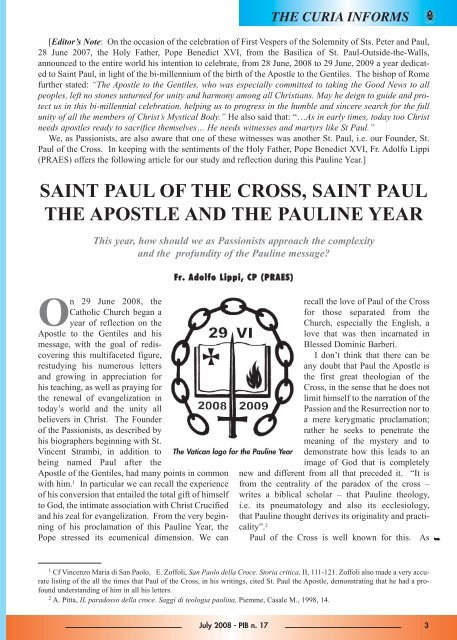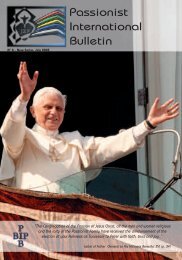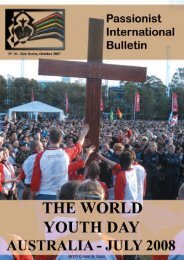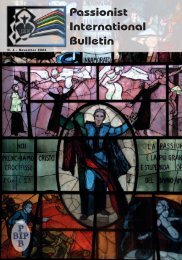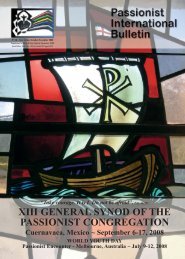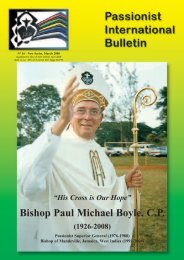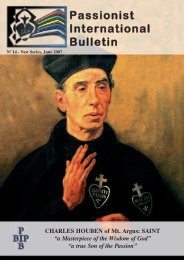the curia informs - Passio Christi
the curia informs - Passio Christi
the curia informs - Passio Christi
You also want an ePaper? Increase the reach of your titles
YUMPU automatically turns print PDFs into web optimized ePapers that Google loves.
THE CURIA INFORMS<br />
[Editor’s Note: On <strong>the</strong> occasion of <strong>the</strong> celebration of First Vespers of <strong>the</strong> Solemnity of Sts. Peter and Paul,<br />
28 June 2007, <strong>the</strong> Holy Fa<strong>the</strong>r, Pope Benedict XVI, from <strong>the</strong> Basilica of St. Paul-Outside-<strong>the</strong>-Walls,<br />
announced to <strong>the</strong> entire world his intention to celebrate, from 28 June, 2008 to 29 June, 2009 a year dedicated<br />
to Saint Paul, in light of <strong>the</strong> bi-millennium of <strong>the</strong> birth of <strong>the</strong> Apostle to <strong>the</strong> Gentiles. The bishop of Rome<br />
fur<strong>the</strong>r stated: “The Apostle to <strong>the</strong> Gentiles, who was especially committed to taking <strong>the</strong> Good News to all<br />
peoples, left no stones unturned for unity and harmony among all <strong>Christi</strong>ans. May he deign to guide and protect<br />
us in this bi-millennial celebration, helping us to progress in <strong>the</strong> humble and sincere search for <strong>the</strong> full<br />
unity of all <strong>the</strong> members of Christ’s Mystical Body.” He also said that: “…As in early times, today too Christ<br />
needs apostles ready to sacrifice <strong>the</strong>mselves… He needs witnesses and martyrs like St Paul.”<br />
We, as <strong>Passio</strong>nists, are also aware that one of <strong>the</strong>se witnesses was ano<strong>the</strong>r St. Paul, i.e. our Founder, St.<br />
Paul of <strong>the</strong> Cross. In keeping with <strong>the</strong> sentiments of <strong>the</strong> Holy Fa<strong>the</strong>r, Pope Benedict XVI, Fr. Adolfo Lippi<br />
(PRAES) offers <strong>the</strong> following article for our study and reflection during this Pauline Year.]<br />
SAINT PAUL OF THE CROSS, SAINT PAUL<br />
THE APOSTLE AND THE PAULINE YEAR<br />
This year, how should we as <strong>Passio</strong>nists approach <strong>the</strong> complexity<br />
and <strong>the</strong> profundity of <strong>the</strong> Pauline message<br />
On 29 June 2008, <strong>the</strong><br />
Catholic Church began a<br />
year of reflection on <strong>the</strong><br />
Apostle to <strong>the</strong> Gentiles and his<br />
message, with <strong>the</strong> goal of rediscovering<br />
this multifaceted figure,<br />
restudying his numerous letters<br />
and growing in appreciation for<br />
his teaching, as well as praying for<br />
<strong>the</strong> renewal of evangelization in<br />
today’s world and <strong>the</strong> unity all<br />
believers in Christ. The Founder<br />
of <strong>the</strong> <strong>Passio</strong>nists, as described by<br />
his biographers beginning with St.<br />
Vincent Strambi, in addition to<br />
being named Paul after <strong>the</strong><br />
Apostle of <strong>the</strong> Gentiles, had many points in common<br />
with him. 1 In particular we can recall <strong>the</strong> experience<br />
of his conversion that entailed <strong>the</strong> total gift of himself<br />
to God, <strong>the</strong> intimate association with Christ Crucified<br />
and his zeal for evangelization. From <strong>the</strong> very beginning<br />
of his proclamation of this Pauline Year, <strong>the</strong><br />
Pope stressed its ecumenical dimension. We can<br />
Fr. Adolfo Lippi, CP (PRAES)<br />
The Vatican logo for <strong>the</strong> Pauline Year<br />
recall <strong>the</strong> love of Paul of <strong>the</strong> Cross<br />
for those separated from <strong>the</strong><br />
Church, especially <strong>the</strong> English, a<br />
love that was <strong>the</strong>n incarnated in<br />
Blessed Dominic Barberi.<br />
I don’t think that <strong>the</strong>re can be<br />
any doubt that Paul <strong>the</strong> Apostle is<br />
<strong>the</strong> first great <strong>the</strong>ologian of <strong>the</strong><br />
Cross, in <strong>the</strong> sense that he does not<br />
limit himself to <strong>the</strong> narration of <strong>the</strong><br />
<strong>Passio</strong>n and <strong>the</strong> Resurrection nor to<br />
a mere kerygmatic proclamation;<br />
ra<strong>the</strong>r he seeks to penetrate <strong>the</strong><br />
meaning of <strong>the</strong> mystery and to<br />
demonstrate how this leads to an<br />
image of God that is completely<br />
new and different from all that preceded it. “It is<br />
from <strong>the</strong> centrality of <strong>the</strong> paradox of <strong>the</strong> cross –<br />
writes a biblical scholar – that Pauline <strong>the</strong>ology,<br />
i.e. its pneumatology and also its ecclesiology,<br />
that Pauline thought derives its originality and practicality”.<br />
2<br />
Paul of <strong>the</strong> Cross is well known for this. As ➥<br />
1 Cf Vincenzo Maria di San Paolo, E. Zoffoli, San Paolo della Croce. Storia critica, II, 111-121. Zoffoli also made a very accurate<br />
listing of <strong>the</strong> all <strong>the</strong> times that Paul of <strong>the</strong> Cross, in his writings, cited St. Paul <strong>the</strong> Apostle, demonstrating that he had a profound<br />
understanding of him in all his letters.<br />
2 A. Pitta, IL paradosso della croce. Saggi di teologia paolina, Piemme, Casale M., 1998, 14.<br />
July 2008 - PIB n. 17<br />
3


